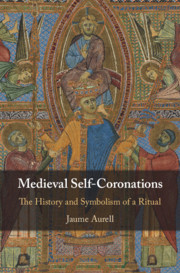7 - Roger II of Sicily
Imagining Self-Coronation
from Part II - Infamy
Published online by Cambridge University Press: 20 May 2020
Summary
The seventh chapter starts with an analysis of the different sources narrating Roger II of Sicily’s ritual coronation, performed on 25 December 1130. Roger sought for his monarchy the appearance of a legitimate kingdom, supported by the weight of tradition, that the Pope had restored with the consent of the princes and the people. The second part of the chapter moves to the interpretation of the image of Roger II being crowned by Christ, as depicted in the mosaic in the Martorana Church in Palermo, one of the strongest indications of the Christocentric evolution outlined in the previous chapters of the book, and a formidable example of symbolic self-coronation. Roger II’s respect for his Muslim Arab subjects, as well as his attempt to assimilate Arab and Byzantine cultural traditions, are at the root of his iconographic programme: the visual language could be understood by Arabs, Normans, Greeks and Latins. This supra-linguistic, multinational, multiethnic and multicultural form is a typical inheritance of the kingdom of Sicily, and would without doubt have inspired the universalist and imperial politics of Roger II’s grandson Frederick II, specifically at his majestic self-coronation in Jerusalem.
Keywords
- Type
- Chapter
- Information
- Medieval Self-CoronationsThe History and Symbolism of a Ritual, pp. 175 - 195Publisher: Cambridge University PressPrint publication year: 2020

